July 8, 2013
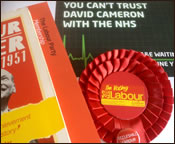 Bradford’s summer has rolled up its shirt sleeves, offering its inhabitants a rare but welcome mixture of bright sunshine, blue skies and genuine warmth in the air. As I look out my window, there are no rainclouds on the horizon, rather, a pleasant haze has settled on the city. Earlier, I drove to Bradford Interchange rail station: the taxi drivers in their ranks were no longer huddling in their vehicles for warmth as is their wont during winter but rather visiting with each other. No jackets were worn. Happy chatter predominated, despite the fact that after all, it’s another Monday.
Bradford’s summer has rolled up its shirt sleeves, offering its inhabitants a rare but welcome mixture of bright sunshine, blue skies and genuine warmth in the air. As I look out my window, there are no rainclouds on the horizon, rather, a pleasant haze has settled on the city. Earlier, I drove to Bradford Interchange rail station: the taxi drivers in their ranks were no longer huddling in their vehicles for warmth as is their wont during winter but rather visiting with each other. No jackets were worn. Happy chatter predominated, despite the fact that after all, it’s another Monday.
Perhaps the city’s general good mood will be sustained by the sunlight’s continued strength: in such weather, the pedestrian precincts of Bradford become an alluring mix of light and shadow, the Victorian buildings with all their alabaster grandeur standing silently by. Perhaps also it will be kept alive by the afterglow of a pleasant weekend; I can fully sympathise. I’ve just had an enjoyable few days, mostly spent in the company of the Bradford Labour Party.
If one reads the newspapers or watches the news, it is tempting to believe that Labour is presently locked in a life or death struggle with the unions, in particular, with Unite. Blairites and Brownites appear on television and mischievous presenters try and provoke conflict between them. Tom Watson has left his high office as Labour’s chief campaigner; Ed Miliband is portrayed as a latter day Sisyphus – every time he pushes up against the vast boulder of the media’s disdain, and eventually beats it, it rolls back down again, supposedly thanks to the lubricant issued by Len McCluskey. Labour certainly needs to take back control of the narrative: at present it suggests that unions are as reputable as crime syndicates, though there is a strong case for suggesting payday lenders (and Tory donors) like Wonga are the real criminals. To put it another way: somehow, the media has decided that unions, made up as they are mostly of people on modest or average incomes, are worse than the avatars of finance which got us into our current economic predicament and are presently perpetuating the malaise. Ed must stare at the top of the hill, look at the boulder placed in his path, sigh, and push against it yet again.
Yet, all this seemed far removed from my weekend with Labour. It began on Friday evening with a Bradford East constituency meeting at City Hall: this was my first official engagement with the party and in preparation for it, I donned a red shirt. My other half Caroline and I were greeted outside the entrance by Councillor (and formerly Bradford’s Lord Mayor) Naveeda Ikram. Her greeting was effusive, only surpassed by that of my local councillor Ruth Billheimer a few days earlier; I don’t think I’ve ever been welcomed to any organisation so warmly. We went inside: Bradford city hall is as splendid on the inside as it is outside. Its theme is essentially Victorian gothic, windows have stained glass symbols representing the various sections of the city. As we entered the wood panelled room in which the meeting was held, I was greeted with a round of applause by all the members around the table: I was momentarily stunned. All I’d really done was leave the Liberal Democrats. For their part, the local Liberal Democrats weren’t all that concerned that I had departed. Earlier in the week, I had been feeding my cat when I heard a knock on the door; as repairmen had been and gone I wondered who it could be. I rushed down and opened it: there stood a Liberal Democrat councillor I had met a couple of times. He seemed earnest enough, and a smile stretched his grey bearded face.
“Can I speak to Dr. Defoe, please,” he asked. I repeat: we had met on a couple of occasions. He had also mangled my surname.
“Yes, that’s me,” I replied, “we’ve met.”
He was flustered for a moment. He continued, “Well, Ruth Billheimer was boasting that she you had joined the Labour Party. I was in the area and wanted to check if it was true.”
“Yes,” I replied.
He lowered his head slightly. “So it is true. Good bye, then.”
I shut the door. There hadn’t been any attempt to persuade me to return. I tried not to laugh.
The meeting featured the Leader of the council, David Green: he had the air of a man who had too much to do and too little time in which to do it and yet feeling horribly responsible for it all. Having met him, it was less surprising that he had good naturedly submitted to the Twitter hashtag of #blamedave.
He gave us an update on the Westfield situation, which seemed positive. However, he also told us facts of which I had been previously unaware: for example, the Department of Education is demanding that school funding is “equalised”, i.e., a school in the suburbs gets the same as one the city. There is a problem with this approach: city based schools often require extra funding and facilities in order to overcome problems associated with poverty or improving language skills. Thus Bradford’s attempts to bolster schools in more deprived areas were likely to be undermined, leading to poorer outcomes. Furthermore, David told us that the cuts in local government spending were likely to be so severe that Bradford would struggle to do more than offer the bare minimum of services. Nevertheless, he said, the council had delivered on projects like the City Park and would continue to do so.
After the meeting ended, Caroline and I went to Nandos for dinner. We sat at an outdoor table and looked out over the City Park: young people were gathering, the pub next door was filled to overflowing with young people, and youthful music, with its insistent pounding beat, was playing. Had the project been a success? It would be difficult to disagree. Standing by was the City Hall, illuminated brightly against the advancing night.
The next day began with my first “Labour Doorstep” event, held in Keighley. The intention of “Labour Doorstep” is to visit voters, ask them about their future voting preferences and address any issues they may have. I awoke early (partially at the insistence of my cat), made coffee, put 3 folding chairs into my car’s boot: they were for the Canterbury Carnival later in the day.
I was a taxi driver, ferrying Ruth, Caroline and a keen young activist named James to our destination. James’ knowledge of Bradford politics is encyclopaedic, and he apparently has the phone number of every Labour politician in the area. He’s fourteen.
I don’t know Keighley particularly well and my satellite navigation knew even less, its calm, strangely accented voice consistently threatening to lead us astray. Nevertheless, we found the small play area on Arctic Street where the activists were gathering. The sun streamed down: the salubrious warmth began to bake me. It was so bright I wasn’t conscious of the fact that I was wearing sunglasses. For a brief time, I stood there talking to Ruth, talking to my other half, talking to other activists: it was like being at an extended family reunion. Everyone was friendly, some were eccentric, we all had something in common despite being wildly different in other respects. We were even asked to pose for the kind of group photos one sees emerging out of family reunions; many had taken out their mobile phones for taking a variety of snapshots. No doubt if there was a conference hall behind us instead of a playground, we would have sat at long tables, broken bread and talked the rest of the day.
Clipboards, maps and leaflets were distributed: my other half, Ruth, James, another Bradford activist named Michael, a Keighley councillor called Adrian Farley and I were split off into a team. We had to drive to the location: my navigation system went insane again and I ended up at the entrance of a golf course. After trying to coax my satellite navigation into providing a sensible location, we ended up where we were supposed to be: it was along a pleasant road leading to the golf course: on either side were stone cottages, some were relatively new, others were Victorian or older. Few cars were in the driveways: this was one time where pleasant weather was unhelpful. Summer in its shirtsleeves invites out of the house to enjoy its splendour not necessarily hear about the clear and present dangers to the National Health Service.
For the most part, I was watching and learning: I observed as Ruth met a voter who had just finished tidying his yard. He was an enthusiastic Labour supporter and they chatted pleasantly as they stood in his open garage. For the most part, however, few were at home: leaflets from the local Labour councillor were folded and pushed through mail slots.
I personally encountered my first voter while accompanying James. He knocked on the door, and an elderly woman wearing a navy blue blouse emerged. James told her who we were and she stated quickly that she had supported Labour, but voted Conservative at the last election. A swing voter: however, she said she was still happy with her choice and shut the door. A swing voter, perhaps, but one who had swung in the wrong direction.
It was time to go. The sun was still streaming down and I was regretting my decision not to wear a hat. Naveeda arrived in her small Toyota and picked up Ruth: our next destination was Horton Park and the Canterbury Carnival.
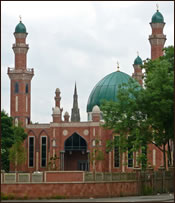 En route, we passed St. Luke’s Hospital. James informed us that it was right on the dividing line of Bradford East and Bradford West constituencies: one half had David Ward for an MP, he noted, the other had George Galloway. We passed the magnificent Little Horton Mosque: a beautiful and imposing structure made of red stone and punctuated by brilliant green domes. James remarked:
En route, we passed St. Luke’s Hospital. James informed us that it was right on the dividing line of Bradford East and Bradford West constituencies: one half had David Ward for an MP, he noted, the other had George Galloway. We passed the magnificent Little Horton Mosque: a beautiful and imposing structure made of red stone and punctuated by brilliant green domes. James remarked:
“Whenever I hear people say that immigrants come here and just take benefits, I remind them that immigrants built places like this.”
We arrived. Following Naveeda’s car, I had the rather surreal experience of driving along the park’s paved footpaths. The sun was still strong, families were out on the grass, children were playing, the tidy flowerbeds were in bloom. Our little convoy passed by a pond, then climbed up a gentle incline. We parked. Labour had a stand in the shade of a tree: across the path stood a bright orange patterned tent, no doubt this was where the festivities would take place. Naveeda drove on: Ruth, Caroline, James, and I along with Ian, our local campaigns officer and several others set up our stand. We blew up red balloons, set out packets of crisps and orange drink pouches. We tried in vain to fasten the balloons to the table with stickers, eventually Sellotape sufficed. We were ready.
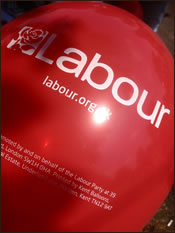 Business was slow at first: a pair of workmen in florescent vests asked for water, we gave it to them. Others sought similar refreshment. We began giving away red Labour balloons to children: unfortunately we had no helium. I discovered a talent for blowing them up and fastening string with slip knots to the ends. We got the parents to sign the petition we had with us, demanding that Cameron cease and desist his changes to the NHS. More children filtered in. The pace of giving away balloons increased. A number of young faces peered at us from around our table, every expression indicating a desire for a balloon. A young blonde boy in a bright green shirt admired Caroline’s red rosette: she gave it to him along with a balloon.
Business was slow at first: a pair of workmen in florescent vests asked for water, we gave it to them. Others sought similar refreshment. We began giving away red Labour balloons to children: unfortunately we had no helium. I discovered a talent for blowing them up and fastening string with slip knots to the ends. We got the parents to sign the petition we had with us, demanding that Cameron cease and desist his changes to the NHS. More children filtered in. The pace of giving away balloons increased. A number of young faces peered at us from around our table, every expression indicating a desire for a balloon. A young blonde boy in a bright green shirt admired Caroline’s red rosette: she gave it to him along with a balloon.
Eventually the Carnival arrived. Naveeda was at its head, carrying a bright red star attached to a tall wooden pole. More children crowded around, more signatures were collected. A Bradford West activist named Khaleed who had come along to help went into the crowds gathering more signatures. Ruth, Naveeda, the Deputy Mayor and Lord Mayor posted for a photograph. A young Indian man performed acrobatics at the top of a pole held by his compatriot: he spun around at the top, impersonating the action of the blades on a helicopter.
We ran out of balloons. We ended with a bang: I accidentally burst the last balloon in my efforts to blow it up. We ran out of pages of the petition to fill: every last space had gone. Naveeda revealed a sumptuous picnic of spicy samosas, onion bhajis and chicken which was second to none. The vegetable samosa in particular had real fire and kick, belting me pleasantly with spices the moment I bit into it. I sat with my colleagues underneath the tree and ate. Nearby, a hawker was selling secondhand clothing for 10 pence per item. The families were beginning to disperse across the park. The sun was beginning its downward arc, slowly processing into twilight. I drank some water: it would be soon time to go.
Already, Ruth and James and Caroline and I were talking about further events. Summer in its shirtsleeves would bring out more fairs and gatherings: we would carry the message outward. Nothing was necessarily inevitable: the cuts weren’t going to help, the changes to the National Health Service had led to an increase in waiting times. The Tories were trapped in an ideology that made a fetish of the market, which was contrary to the spirit of the Health Service. The whole idea of charging foreigners for using it was merely a gateway drug, trying to get the public used to the concept of paying. It was possible to do something different. Perhaps summer in its rolled up shirtsleeves made hope more apparent: it’s difficult to think of such a day when doused by November rain, difficult to see the possibilities when your information comes solely from the popular press. We would have to carry enlightenment with us and spread it outward.
It was time to go home: the next day promised a trip to Halifax to pick up some end tables acquired on eBay and watching Sunday politics programmes. That evening, I happened across a clause in the Labour Party rulebook:
“The party is anxious to encourage the recruitment of new members and to ensure that new members are properly welcomed into the party and opportunities offered to enable their full participation in all aspects of party life.”
I thought, yes, I was just at the start, but at the same time, it felt like I’d been there for much longer. This past weekend, I’d been properly welcomed: indeed I felt like I had come home.
 The so-called “War on Drugs”, at least as an exercise in law enforcement, may be drawing to a close. On December 11th, Uruguay legalised the trade and possession of marijuana for recreational use. On January 1st, the state of Colorado permitted its sale for the same purpose. On January 2nd, the conservatively inclined Fox Business Network sent a reporter to a Colorado facility which was growing marijuana: the somewhat bleary eyed and distracted owner suggested that fourteen other states were likely to follow in his state’s footsteps and another two were contemplating loosening legislation to allow its consumption for medical purposes. It was also mentioned that the potential value of the market was in the region of $2.5 billion. On the same day, Fox Business’ website reported that the shares of a company called MedBox, which manufactures marijuana dispensing machines, were up by 57%.
The so-called “War on Drugs”, at least as an exercise in law enforcement, may be drawing to a close. On December 11th, Uruguay legalised the trade and possession of marijuana for recreational use. On January 1st, the state of Colorado permitted its sale for the same purpose. On January 2nd, the conservatively inclined Fox Business Network sent a reporter to a Colorado facility which was growing marijuana: the somewhat bleary eyed and distracted owner suggested that fourteen other states were likely to follow in his state’s footsteps and another two were contemplating loosening legislation to allow its consumption for medical purposes. It was also mentioned that the potential value of the market was in the region of $2.5 billion. On the same day, Fox Business’ website reported that the shares of a company called MedBox, which manufactures marijuana dispensing machines, were up by 57%. 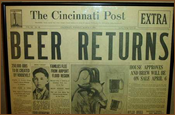 So long as the anarchy fostered by illegality remained, we were not in a position to ask and address these questions effectively: rather, we were left with the threat of prison, as if humanity could be punished into sensible behaviour. The fateful experience of America with alcohol prohibition in the 1920’s and 1930’s should have proved otherwise; all that fatally flawed experiment did was create a market for poisonous moonshine and made petty gangsters into millionaires. Governments throughout the world have spent billions of dollars in re-learning this particular lesson. The changes put in place by Uruguay and Colorado suggest we’re now at a moment analogous to when Franklin Roosevelt made it legal to drink 2% beer: this small crack in the legal log jam opened wide shortly afterwards.
So long as the anarchy fostered by illegality remained, we were not in a position to ask and address these questions effectively: rather, we were left with the threat of prison, as if humanity could be punished into sensible behaviour. The fateful experience of America with alcohol prohibition in the 1920’s and 1930’s should have proved otherwise; all that fatally flawed experiment did was create a market for poisonous moonshine and made petty gangsters into millionaires. Governments throughout the world have spent billions of dollars in re-learning this particular lesson. The changes put in place by Uruguay and Colorado suggest we’re now at a moment analogous to when Franklin Roosevelt made it legal to drink 2% beer: this small crack in the legal log jam opened wide shortly afterwards.
 New Year’s is, by and large, tinged with regret. If the year has been particularly difficult, there’s marginal relief to be had at its conclusion; if the year has been splendid, then there’s sadness at leaving it behind and some trepidation as to what the future may bring. Either way, it represents the outer frontier of the holiday season: beyond it, alarm clocks, early mornings, hastily consumed cups of coffee and the commute back to work all beckon. The lights come down, the trees are set out as rubbish, the stores start aggressively marketing Valentine’s Day wares, the holiday season is tucked into the space of memory, revisited mainly when photo albums are opened. Christmas 2013 is finished; the realities of winter remain. As I write this, I am sitting in New York, and a blizzard warning is in effect for this evening. Tomorrow I’ll go out into what the storm leaves behind with my Bradford City scarf tied around my neck and hoist a snow shovel to help ensure my parents’ car isn’t trapped on the driveway.
New Year’s is, by and large, tinged with regret. If the year has been particularly difficult, there’s marginal relief to be had at its conclusion; if the year has been splendid, then there’s sadness at leaving it behind and some trepidation as to what the future may bring. Either way, it represents the outer frontier of the holiday season: beyond it, alarm clocks, early mornings, hastily consumed cups of coffee and the commute back to work all beckon. The lights come down, the trees are set out as rubbish, the stores start aggressively marketing Valentine’s Day wares, the holiday season is tucked into the space of memory, revisited mainly when photo albums are opened. Christmas 2013 is finished; the realities of winter remain. As I write this, I am sitting in New York, and a blizzard warning is in effect for this evening. Tomorrow I’ll go out into what the storm leaves behind with my Bradford City scarf tied around my neck and hoist a snow shovel to help ensure my parents’ car isn’t trapped on the driveway. Such pleas are bound to fail. Eventually, we face New Year’s Eve: it’s no wonder so many people get drunk on the night. I happened across one New Year’s Eve television programme which showed a correspondent in Miami who was obviously inebriated. He wandered aimlessly around a hotel with a roving camera team. He made a point of speaking, albeit with slurred and disconnected words, to young women who were all in a semi-state of undress. They appeared to be no more sober than he was. I could easily imagine him waking up the next morning with a damaged career as well as a hangover. Another reporter was in a New York dance club: he was accompanied by women who looked like they were extras from Robert Palmer music videos with their slicked back hair, bright red lipstick, limited dance movements and absolute silence. One of them poured cheap champagne out as freely as if it was water. My father changed the channel and found a testament to how these New Year’s programmes have become ever more mired in mediocrity: there was a show entitled “Dick Clark’s Rocking New Year’s with Ryan Seacrest”. Dick Clark, the long time host of “American Bandstand” (a programme similar to Britain’s “Top of the Pops”) had presented a New Year’s show right up until the year of his death. He was an American institution and presented the New Year with skill and brio. His successor, Mr. Seacrest, as the title of the programme indicates, obviously lacks Mr. Clark’s talents; indeed, this is one of the very few television shows to my knowledge which refers to a deceased host in order to maintain its attractiveness. Mr. Seacrest also made the ill-advised choice of inviting Miley Cyrus, who wore an oversized white fur coat and a vacant expression. Fortunately, the last ten seconds of all the programmes were the same: at Times Square, the lighted crystal ball descended, the crowd chanted the countdown from 10, the ball landed and a sign reading “2014” lit up. Sinatra’s “New York, New York” rang through the air, couples kissed and confetti fell. My family raised a toast. Then my father switched the television off and bid us all good night.
Such pleas are bound to fail. Eventually, we face New Year’s Eve: it’s no wonder so many people get drunk on the night. I happened across one New Year’s Eve television programme which showed a correspondent in Miami who was obviously inebriated. He wandered aimlessly around a hotel with a roving camera team. He made a point of speaking, albeit with slurred and disconnected words, to young women who were all in a semi-state of undress. They appeared to be no more sober than he was. I could easily imagine him waking up the next morning with a damaged career as well as a hangover. Another reporter was in a New York dance club: he was accompanied by women who looked like they were extras from Robert Palmer music videos with their slicked back hair, bright red lipstick, limited dance movements and absolute silence. One of them poured cheap champagne out as freely as if it was water. My father changed the channel and found a testament to how these New Year’s programmes have become ever more mired in mediocrity: there was a show entitled “Dick Clark’s Rocking New Year’s with Ryan Seacrest”. Dick Clark, the long time host of “American Bandstand” (a programme similar to Britain’s “Top of the Pops”) had presented a New Year’s show right up until the year of his death. He was an American institution and presented the New Year with skill and brio. His successor, Mr. Seacrest, as the title of the programme indicates, obviously lacks Mr. Clark’s talents; indeed, this is one of the very few television shows to my knowledge which refers to a deceased host in order to maintain its attractiveness. Mr. Seacrest also made the ill-advised choice of inviting Miley Cyrus, who wore an oversized white fur coat and a vacant expression. Fortunately, the last ten seconds of all the programmes were the same: at Times Square, the lighted crystal ball descended, the crowd chanted the countdown from 10, the ball landed and a sign reading “2014” lit up. Sinatra’s “New York, New York” rang through the air, couples kissed and confetti fell. My family raised a toast. Then my father switched the television off and bid us all good night. Furthermore, by jumping over most of the 1950’s, 1960’s and 1970’s, Loach completely overlooks key events like the struggle between Harold Wilson’s Labour government and the trade unions. Neither Barbara Castle nor “In Place of Strife” are mentioned. One can argue that these ruptures within the framework of a functioning social democracy are preferable to the anarchy and squalor of laissez faire policies, but nevertheless, to ignore them entirely weakens the argument. It also means that Labour’s evolution into the party it is today is more inexplicable: an uninformed viewer would wonder why Labour “dropped” the unions. The truth is, and Ed Miliband appears to understand this, that as work has evolved, unions have evolved too and with it, so has the Labour Party. The mass industries of old no longer exist: there are more self-employed people than ever before. Small businesses, i.e. ones which are not conducive for the growth of mass trade unions, predominate. Labour has had to manage the rather difficult feat of maintaining one foot in the past while taking a step towards the future. Loach does not explain any of this.
Furthermore, by jumping over most of the 1950’s, 1960’s and 1970’s, Loach completely overlooks key events like the struggle between Harold Wilson’s Labour government and the trade unions. Neither Barbara Castle nor “In Place of Strife” are mentioned. One can argue that these ruptures within the framework of a functioning social democracy are preferable to the anarchy and squalor of laissez faire policies, but nevertheless, to ignore them entirely weakens the argument. It also means that Labour’s evolution into the party it is today is more inexplicable: an uninformed viewer would wonder why Labour “dropped” the unions. The truth is, and Ed Miliband appears to understand this, that as work has evolved, unions have evolved too and with it, so has the Labour Party. The mass industries of old no longer exist: there are more self-employed people than ever before. Small businesses, i.e. ones which are not conducive for the growth of mass trade unions, predominate. Labour has had to manage the rather difficult feat of maintaining one foot in the past while taking a step towards the future. Loach does not explain any of this. Bradford’s summer has rolled up its shirt sleeves, offering its inhabitants a rare but welcome mixture of bright sunshine, blue skies and genuine warmth in the air. As I look out my window, there are no rainclouds on the horizon, rather, a pleasant haze has settled on the city. Earlier, I drove to Bradford Interchange rail station: the taxi drivers in their ranks were no longer huddling in their vehicles for warmth as is their wont during winter but rather visiting with each other. No jackets were worn. Happy chatter predominated, despite the fact that after all, it’s another Monday.
Bradford’s summer has rolled up its shirt sleeves, offering its inhabitants a rare but welcome mixture of bright sunshine, blue skies and genuine warmth in the air. As I look out my window, there are no rainclouds on the horizon, rather, a pleasant haze has settled on the city. Earlier, I drove to Bradford Interchange rail station: the taxi drivers in their ranks were no longer huddling in their vehicles for warmth as is their wont during winter but rather visiting with each other. No jackets were worn. Happy chatter predominated, despite the fact that after all, it’s another Monday. En route, we passed St. Luke’s Hospital. James informed us that it was right on the dividing line of Bradford East and Bradford West constituencies: one half had David Ward for an MP, he noted, the other had George Galloway. We passed the magnificent Little Horton Mosque: a beautiful and imposing structure made of red stone and punctuated by brilliant green domes. James remarked:
En route, we passed St. Luke’s Hospital. James informed us that it was right on the dividing line of Bradford East and Bradford West constituencies: one half had David Ward for an MP, he noted, the other had George Galloway. We passed the magnificent Little Horton Mosque: a beautiful and imposing structure made of red stone and punctuated by brilliant green domes. James remarked: Business was slow at first: a pair of workmen in florescent vests asked for water, we gave it to them. Others sought similar refreshment. We began giving away red Labour balloons to children: unfortunately we had no helium. I discovered a talent for blowing them up and fastening string with slip knots to the ends. We got the parents to sign the petition we had with us, demanding that Cameron cease and desist his changes to the NHS. More children filtered in. The pace of giving away balloons increased. A number of young faces peered at us from around our table, every expression indicating a desire for a balloon. A young blonde boy in a bright green shirt admired Caroline’s red rosette: she gave it to him along with a balloon.
Business was slow at first: a pair of workmen in florescent vests asked for water, we gave it to them. Others sought similar refreshment. We began giving away red Labour balloons to children: unfortunately we had no helium. I discovered a talent for blowing them up and fastening string with slip knots to the ends. We got the parents to sign the petition we had with us, demanding that Cameron cease and desist his changes to the NHS. More children filtered in. The pace of giving away balloons increased. A number of young faces peered at us from around our table, every expression indicating a desire for a balloon. A young blonde boy in a bright green shirt admired Caroline’s red rosette: she gave it to him along with a balloon. So, I quit the Liberal Democrats and joined Labour.
So, I quit the Liberal Democrats and joined Labour.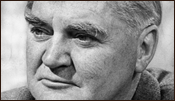 Having resolved to leave, it didn’t necessarily follow I’d join Labour. Yes, I’ve previously been involved in a trade union; I was even a chapter president for a time. Yes, much of my economic analysis dovetails nicely with what has been said by the Shadow Cabinet. I’d much rather see a Labour government than what we have currently. Watching
Having resolved to leave, it didn’t necessarily follow I’d join Labour. Yes, I’ve previously been involved in a trade union; I was even a chapter president for a time. Yes, much of my economic analysis dovetails nicely with what has been said by the Shadow Cabinet. I’d much rather see a Labour government than what we have currently. Watching  I looked at the form. It was printed on green paper; the black sans-serif letters ensured the questions were clear: did I want to be a councillor, was there anything in my past that could embarass the party, and why did I want to do this? As I scanned the paper, I exhaled.
I looked at the form. It was printed on green paper; the black sans-serif letters ensured the questions were clear: did I want to be a councillor, was there anything in my past that could embarass the party, and why did I want to do this? As I scanned the paper, I exhaled. So, accompanied by friends and my significant other, I went in. After parking the car, our party set off by foot. In the distance, I could hear pop music booming out of outdoor speakers. The sound echoed throughout the city centre, ricocheting off of buildings both illuminated by sunlight and cast in shadow. Upon arriving at Centenary Square, I saw that Bradford Pride was in full swing right in front of the majestic town hall: the city’s LGBT community apparently hadn’t been at all cowed by the threat of the EDL. In fact, I didn’t see any EDL presence whatsoever. In contrast, Bradford Pride was as diverse as it possibly be: a young man was singing on stage, in the audience were two women dressed in niqabs. Couples of all varieties were on show, visiting the beer tent, wading in Centenary Square’s vast water feature, eating at outdoor restaurant tables in the golden light and warmth.
So, accompanied by friends and my significant other, I went in. After parking the car, our party set off by foot. In the distance, I could hear pop music booming out of outdoor speakers. The sound echoed throughout the city centre, ricocheting off of buildings both illuminated by sunlight and cast in shadow. Upon arriving at Centenary Square, I saw that Bradford Pride was in full swing right in front of the majestic town hall: the city’s LGBT community apparently hadn’t been at all cowed by the threat of the EDL. In fact, I didn’t see any EDL presence whatsoever. In contrast, Bradford Pride was as diverse as it possibly be: a young man was singing on stage, in the audience were two women dressed in niqabs. Couples of all varieties were on show, visiting the beer tent, wading in Centenary Square’s vast water feature, eating at outdoor restaurant tables in the golden light and warmth.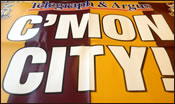 Could Bradford be improved? Certainly: compare it to London and it’s obvious that there is a vast difference in wealth. Nevertheless, Bradford possesses fertile soil from which the green shoots of a renaissance could emerge: there is fibre optic broadband available in much of the city, it is a particularly young town, and even its industrial heritage makes it appealing to those who like “steampunk” couture. It is held back by a number of factors: central government, for example, seems determined to reduce the city to penury, cutting its budget with all the aggression of a crazed butcher with a chainsaw. Most recently, the National Media Museum, which has a wonderful IMAX theatre, was put under threat. Bradford has also suffered from a notable lack of self-belief, though the recent promotion of Bradford City FC to League One seems to have provided a much needed boost to the city’s psyche. Bradford’s politics are an additional barrier: an electorate that can enthusiastically vote for George Galloway is showing obvious signs of stress. For eight years, as control of Bradford city council passed between Labour and Coalition parties, the development of a shopping mall in the city centre has languished: was this due to political timidity? Was it due to stupidity? Both? It’s only been recently that the end of “the Hole’s” tenure in Bradford has come within sight.
Could Bradford be improved? Certainly: compare it to London and it’s obvious that there is a vast difference in wealth. Nevertheless, Bradford possesses fertile soil from which the green shoots of a renaissance could emerge: there is fibre optic broadband available in much of the city, it is a particularly young town, and even its industrial heritage makes it appealing to those who like “steampunk” couture. It is held back by a number of factors: central government, for example, seems determined to reduce the city to penury, cutting its budget with all the aggression of a crazed butcher with a chainsaw. Most recently, the National Media Museum, which has a wonderful IMAX theatre, was put under threat. Bradford has also suffered from a notable lack of self-belief, though the recent promotion of Bradford City FC to League One seems to have provided a much needed boost to the city’s psyche. Bradford’s politics are an additional barrier: an electorate that can enthusiastically vote for George Galloway is showing obvious signs of stress. For eight years, as control of Bradford city council passed between Labour and Coalition parties, the development of a shopping mall in the city centre has languished: was this due to political timidity? Was it due to stupidity? Both? It’s only been recently that the end of “the Hole’s” tenure in Bradford has come within sight.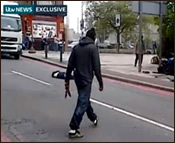 As it turned out, those who murdered drummer Lee Rigby were about as nondescript as you could get. The horrifying video of Michael Abedolajo holding blood soaked blades indicated he was wearing nothing more extraordinary than blue jeans, a hoodie and running shoes. A photograph of his counterpart showed he was similarly difficult to spot in a crowd: he wore a khaki jacket which looked like it had been acquired from a discount store.
As it turned out, those who murdered drummer Lee Rigby were about as nondescript as you could get. The horrifying video of Michael Abedolajo holding blood soaked blades indicated he was wearing nothing more extraordinary than blue jeans, a hoodie and running shoes. A photograph of his counterpart showed he was similarly difficult to spot in a crowd: he wore a khaki jacket which looked like it had been acquired from a discount store.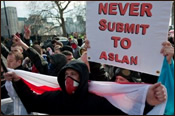 This void also offers opportunities for those who profit off of division: UKIP proclaims it is “non-racist” or “anti-racist”, but its attacks on immigration chime in a particular way to those who wish to remove influences seen as “foreign”. The English Defence League is an outlet for the anti-intellectual and disenfranchised who despise the world as it is and seize upon the simplistic expedient of blaming the “other”; they too find oxygen in such a space, as their world view is lent some credibility by those who govern us. On the other hand, the preachers of hate and intolerance can also point at the authorities and say that Muslims will never be full citizens in a land that perceives them as alien, and indeed, such a state is anathema and will never dispense true justice until it espouses their faith.
This void also offers opportunities for those who profit off of division: UKIP proclaims it is “non-racist” or “anti-racist”, but its attacks on immigration chime in a particular way to those who wish to remove influences seen as “foreign”. The English Defence League is an outlet for the anti-intellectual and disenfranchised who despise the world as it is and seize upon the simplistic expedient of blaming the “other”; they too find oxygen in such a space, as their world view is lent some credibility by those who govern us. On the other hand, the preachers of hate and intolerance can also point at the authorities and say that Muslims will never be full citizens in a land that perceives them as alien, and indeed, such a state is anathema and will never dispense true justice until it espouses their faith.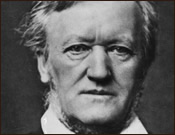 I work in an open plan office; there are positives and negatives. On the plus side, at least I’m not confined to a cubicle and I can converse with many of my colleagues without leaving my chair. Less happily, when it’s a particularly busy day and the phones are going off every few minutes and the keyboards are clattering on, it can be noisy the point that it’s impossible to hear oneself think. To help remedy this, I bring in my iPod and a set of sturdy headphones; when I have intricate work to do, I tend to put on the music of Richard Wagner. As today is the bicentenary of his birth, I have more cause to consider him than usual.
I work in an open plan office; there are positives and negatives. On the plus side, at least I’m not confined to a cubicle and I can converse with many of my colleagues without leaving my chair. Less happily, when it’s a particularly busy day and the phones are going off every few minutes and the keyboards are clattering on, it can be noisy the point that it’s impossible to hear oneself think. To help remedy this, I bring in my iPod and a set of sturdy headphones; when I have intricate work to do, I tend to put on the music of Richard Wagner. As today is the bicentenary of his birth, I have more cause to consider him than usual.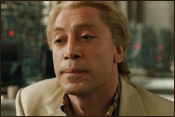 All these positives, however, cannot fully mask the film’s problems. Firstly, the antagonism at the heart of the story is more than somewhat ludicrous: MI6 is threatened by a lone criminal (and his hired cronies) who is hell bent destroying the agency and M in particular. Javier Bardem, playing the villain, looks more than mildly preposterous with blonde hair; he is also shown to be a typical Bond grotesque, complete with a prosthetic device that reminded me of Moonraker’s “Jaws”. His motives are rather facile from a plot perspective: he was once a British agent, later handed over by M to the Chinese as part of a deal. He intends to avenge this betrayal.
All these positives, however, cannot fully mask the film’s problems. Firstly, the antagonism at the heart of the story is more than somewhat ludicrous: MI6 is threatened by a lone criminal (and his hired cronies) who is hell bent destroying the agency and M in particular. Javier Bardem, playing the villain, looks more than mildly preposterous with blonde hair; he is also shown to be a typical Bond grotesque, complete with a prosthetic device that reminded me of Moonraker’s “Jaws”. His motives are rather facile from a plot perspective: he was once a British agent, later handed over by M to the Chinese as part of a deal. He intends to avenge this betrayal.  I was once a Catholic; I went to a Catholic school. I recall receiving my first Holy Communion on a bright Spring morning; all the children taking part were obliged to have a banner made by their families proclaiming their love and support. My Swedish grandmother, though she was Lutheran, made my banner. It read:
I was once a Catholic; I went to a Catholic school. I recall receiving my first Holy Communion on a bright Spring morning; all the children taking part were obliged to have a banner made by their families proclaiming their love and support. My Swedish grandmother, though she was Lutheran, made my banner. It read: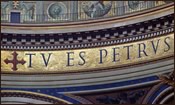 Perhaps thanks in part to Benedict’s reactionary temperament, the Vatican is still one of the few places in which the past not only lives, it’s nearly as tangible as the present. The unearthing of deceased Popes began the moment that Benedict XVI announced his retirement: it was pointed out he was the first Pope to resign since Gregory XII in 1415, which was done to heal a schism in the church. Some have qualified this statement by saying Benedict is the first Pope to quit voluntarily since Celestine V in 1294. There is an additional argument which could be made: there was a period in which there were several Popes all vying for recognition. One of them, Felix V, gave up his claim in 1449 and was later made a cardinal; this act brought the period of multiple popes to an end. One would think that with this track record that there would be little dispute that the Pope can quit: as is apparent, for a time they were abdicating left, right and centre. As with anything else associated with the Catholic Church, this is not the case. I have visited St. Peter’s Basilica, and inscribed on the inside of its main dome are Christ’s words to Peter: “Tu es Petrus”. This translates as “Thou art Peter”: as any Catholic schoolboy can tell you, Peter means “rock”. This is followed by Jesus’ addendum, “et super hanc petram aedificabo Ecclesiam meam et tibi dabo claves regni caelorum”, which means “And upon this rock I shall build My Church and I will give you the keys to the Kingdom of Heaven.” These words represent authority: the Popes are referred to as Peter’s direct heirs. The supposed “keys to Kingdom of Heaven” are part of the Papal seal. Some Catholics no doubt argue or at least feel that such an obligation cannot be simply cast aside. But the Pope is also supposedly infallible on matters of doctrine “concerning faith or morals”, or has been since the First Vatican Council (1869-1870). But in the end, the arguments are for nought: Benedict will leave at the end of the month. There will be a conclave of the College of Cardinals, a cloistered event which in the era of “Big Brother” should likely be televised and narrated by someone from Newcastle until they’re ready to proclaim “Habemus Papam”. That’s that.
Perhaps thanks in part to Benedict’s reactionary temperament, the Vatican is still one of the few places in which the past not only lives, it’s nearly as tangible as the present. The unearthing of deceased Popes began the moment that Benedict XVI announced his retirement: it was pointed out he was the first Pope to resign since Gregory XII in 1415, which was done to heal a schism in the church. Some have qualified this statement by saying Benedict is the first Pope to quit voluntarily since Celestine V in 1294. There is an additional argument which could be made: there was a period in which there were several Popes all vying for recognition. One of them, Felix V, gave up his claim in 1449 and was later made a cardinal; this act brought the period of multiple popes to an end. One would think that with this track record that there would be little dispute that the Pope can quit: as is apparent, for a time they were abdicating left, right and centre. As with anything else associated with the Catholic Church, this is not the case. I have visited St. Peter’s Basilica, and inscribed on the inside of its main dome are Christ’s words to Peter: “Tu es Petrus”. This translates as “Thou art Peter”: as any Catholic schoolboy can tell you, Peter means “rock”. This is followed by Jesus’ addendum, “et super hanc petram aedificabo Ecclesiam meam et tibi dabo claves regni caelorum”, which means “And upon this rock I shall build My Church and I will give you the keys to the Kingdom of Heaven.” These words represent authority: the Popes are referred to as Peter’s direct heirs. The supposed “keys to Kingdom of Heaven” are part of the Papal seal. Some Catholics no doubt argue or at least feel that such an obligation cannot be simply cast aside. But the Pope is also supposedly infallible on matters of doctrine “concerning faith or morals”, or has been since the First Vatican Council (1869-1870). But in the end, the arguments are for nought: Benedict will leave at the end of the month. There will be a conclave of the College of Cardinals, a cloistered event which in the era of “Big Brother” should likely be televised and narrated by someone from Newcastle until they’re ready to proclaim “Habemus Papam”. That’s that. I'm a Doctor of both Creative Writing and Manufacturing and Mechanical Engineering, a novelist, a technologist, and still an amateur in much else.
I'm a Doctor of both Creative Writing and Manufacturing and Mechanical Engineering, a novelist, a technologist, and still an amateur in much else.




